Serving 1,246 students in grades Kindergarten-12, East Wake Academy ranks in the top 30% of all schools in North Carolina for overall test scores (math proficiency is top 50%, and reading proficiency is top 50%).
The percentage of students achieving proficiency in math is 59% (which is higher than the North Carolina state average of 51%). The percentage of students achieving proficiency in reading/language arts is 61% (which is higher than the North Carolina state average of 50%).
The student:teacher ratio of 15:1 is equal to the North Carolina state level of 15:1.
Minority enrollment is 30% of the student body (majority Black and Hispanic), which is lower than the North Carolina state average of 57% (majority Black).
Quick Stats (2025)
- School Type: Charter School
- Grades: Kindergarten-12
- Enrollment: 1,246 students
- Student:Teacher Ratio: 15:1
- Minority Enrollment: 30%
- Graduation Rate: ≥95% (Top 5% in NC)
- Overall Testing Rank: Top 30%
- Math Proficiency: 59% (Top 50%)
- Reading Proficiency: 61% (Top 30%)
- Science Proficiency: 68% (Top 50%)
- Source: National Center for Education Statistics (NCES), NC Dept. of Education
Top Rankings
East Wake Academy ranks among the top 20% of public schools in North Carolina for:
Category
Attribute
Graduation Rate
School Overview
East Wake Academy's student population of 1,246 students has grown by 5% over five school years.
The teacher population of 83 teachers has grown by 13% over five school years.
School Type
Grades Offered
Grades Kindergarten-12
Total Students
1,246 students
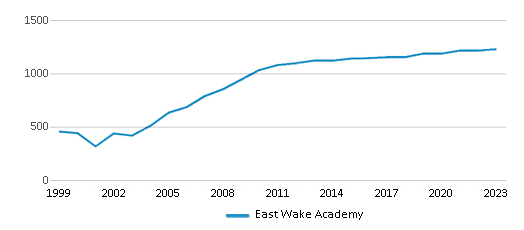
Gender %
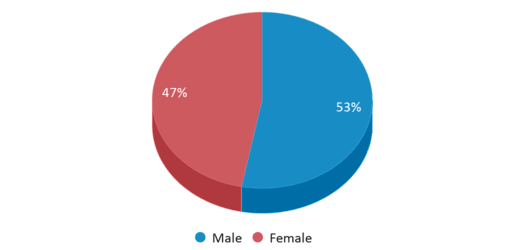
Total Classroom Teachers
83 teachers
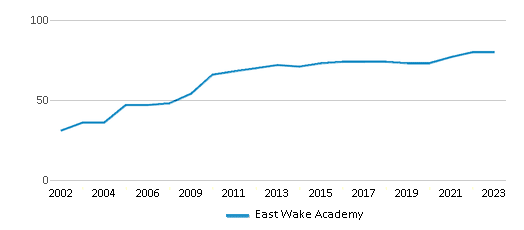
Students by Grade
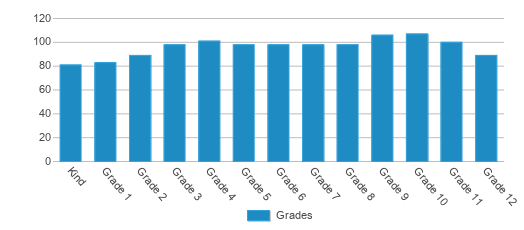
School Rankings
East Wake Academy ranks within the top 30% of all 2,617 schools in North Carolina (based off of combined math and reading proficiency testing data).
The diversity score of East Wake Academy is 0.48, which is less than the diversity score at state average of 0.71. The school's diversity has stayed relatively flat over five school years.
Overall Testing Rank
#735 out of 2617 schools
(Top 30%)
(Top 30%)
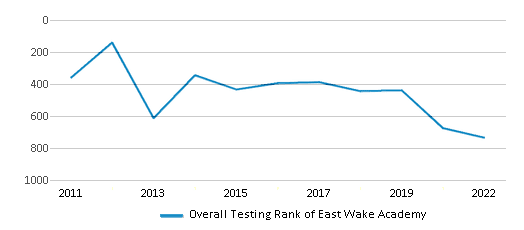
Math Test Scores (% Proficient)
59%
51%
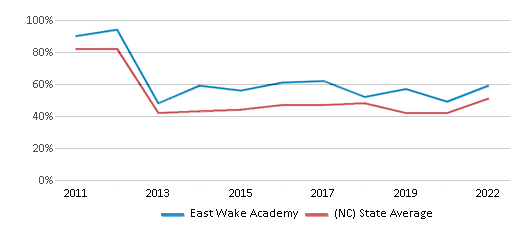
Reading/Language Arts Test Scores (% Proficient)
61%
50%
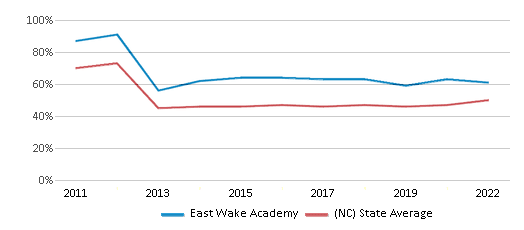
Science Test Scores (% Proficient)
68%
63%
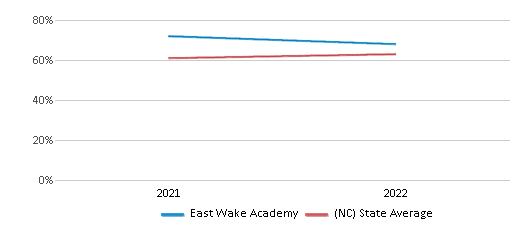
Student : Teacher Ratio
15:1
15:1
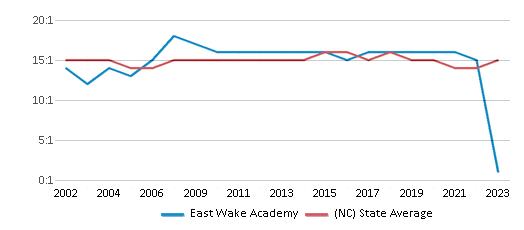
American Indian
n/a
1%
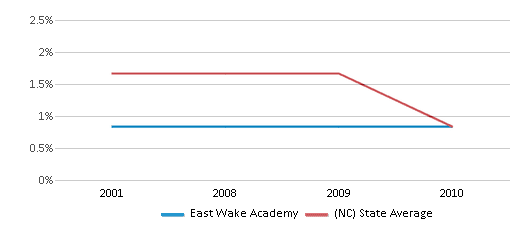
Asian
1%
4%
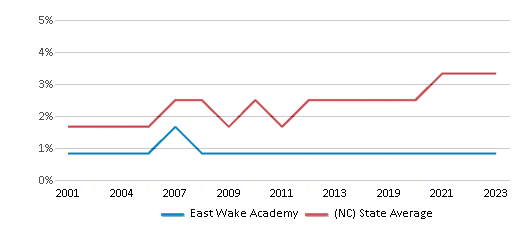
Hispanic
11%
21%
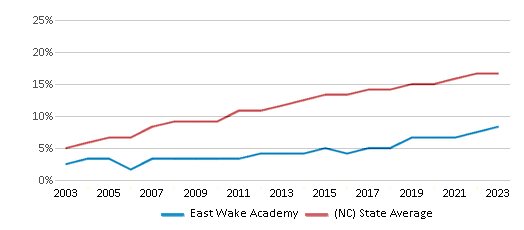
Black
12%
25%
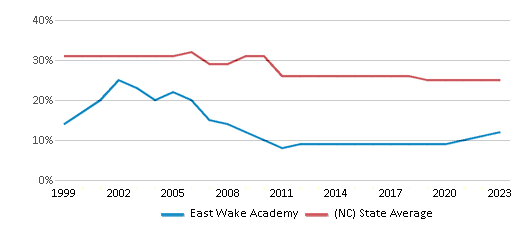
White
70%
43%
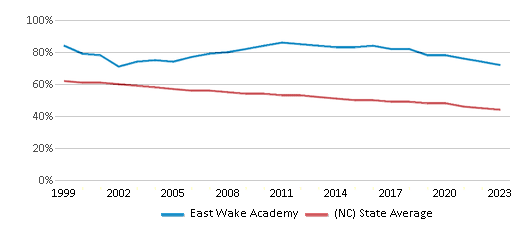
Hawaiian
n/a
n/a
Two or more races
6%
6%
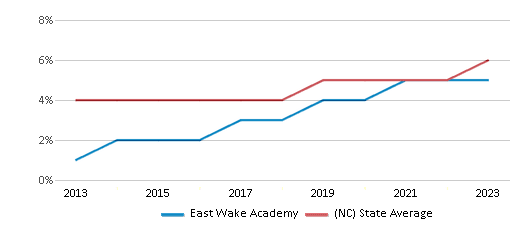
All Ethnic Groups
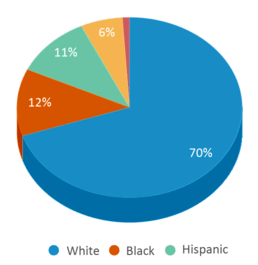
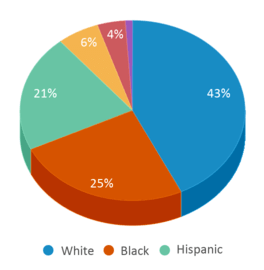
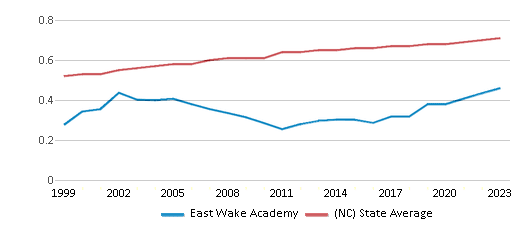
Graduation Rate
≥95%
86%
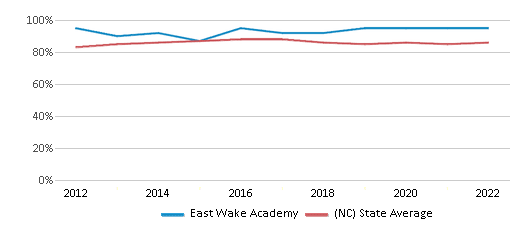
Eligible for Free Lunch
9%
68%
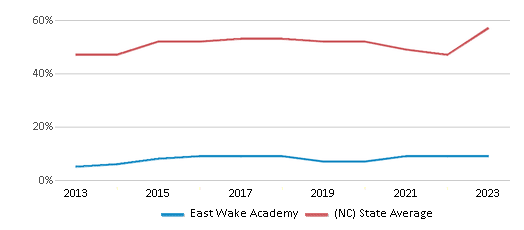
Eligible for Reduced Lunch
12%
1%
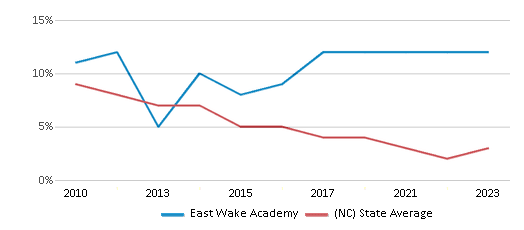
School Statewide Testing
School District Name
Source: National Center for Education Statistics (NCES), NC Dept. of Education
Profile last updated: 02/09/2025
Frequently Asked Questions
What is East Wake Academy's ranking?
East Wake Academy is ranked #735 out of 2,617 schools, which ranks it among the top 30% of public schools in North Carolina.
What percent of students have achieved state testing proficiency in math and reading?
59% of students have achieved math proficiency (compared to the 51% NC state average), while 61% of students have achieved reading proficiency (compared to the 50% NC state average).
What is the graduation rate of East Wake Academy?
The graduation rate of East Wake Academy is 95%, which is higher than the North Carolina state average of 86%.
How many students attend East Wake Academy?
1,246 students attend East Wake Academy.
What is the racial composition of the student body?
70% of East Wake Academy students are White, 12% of students are Black, 11% of students are Hispanic, 6% of students are Two or more races, and 1% of students are Asian.
What is the student:teacher ratio of East Wake Academy?
East Wake Academy has a student ration of 15:1, which is equal to the North Carolina state average of 15:1.
What grades does East Wake Academy offer ?
East Wake Academy offers enrollment in grades Kindergarten-12
What school district is East Wake Academy part of?
East Wake Academy is part of East Wake Academy School District.
School Reviews
5 8/18/2020
I have 4 children that attend the elementary school and couldn't be happier with the teachers and staff. They provide a supportive learning environment and consistently drive our children. They are patient and willing to go the extra mile for their students. The charter school board of directors are made up of invested parents and the administration the woman is referring to above are gone.
2 1/10/2012
This school has gone down hill drastically lately. I have three children in the school in all sides of the school. The Headmaster has become increasingly driven by money almost to the point that many parents think they can buy a better grade by giving to the school. Actually the headmaster said at the Christmas show and auction that report cards are coming out and if you want a better grade you should pay up! My and my husband walked in there one day to check on our children to hear the teachers yelling at the kids, when we tried to go to a headmaster they are apparently to good to speak to the parents to so you have to go through their assistant. We have started to have many other issues and the administration never gets back to us, the one time they did they didn't seem like they cared. I think this is a school that has gotten so big that they forgot how they got there and we will probably continue to see things go downhill unless a change is made, specifically the headmaster. Don't think that the 8 on the great schools rating is because it is a great school, there are amazing parents that bring their smart children there.
Review East Wake Academy. Reviews should be a few sentences in length. Please include any comments on:
- Quality of academic programs, teachers, and facilities
- Availability of music, art, sports and other extracurricular activities
Recent Articles

What Is A Charter School?
Explore the world of charter schools in this comprehensive guide. Learn about their history, how they operate, and the pros and cons of this educational innovation. Discover key facts about charter schools, including admission policies, demographics, and funding, as well as what to look for when considering a charter school for your child.

10 Reasons Why High School Sports Benefit Students
Discover the 10 compelling reasons why high school sports are beneficial for students. This comprehensive article explores how athletics enhance academic performance, foster personal growth, and develop crucial life skills. From improved fitness and time management to leadership development and community representation, learn why participating in high school sports can be a game-changer for students' overall success and well-being.

February 05, 2025
Understanding the U.S. Department of Education: Structure, Impact, and EvolutionWe explore how the Department of Education shapes American education, from its cabinet-level leadership to its impact on millions of students, written for general audiences seeking clarity on this vital institution.









